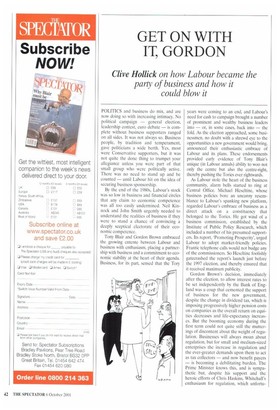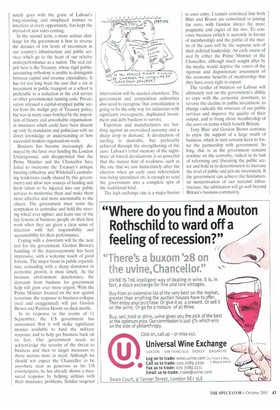GET ON WITH IT, GORDON
Clive Holliek on how Labour became the
party of business and how it could blow it
POLITICS and business do mix, and are now doing so with increasing intimacy. No political campaign — general election, leadership contest, euro debate — is complete without business supporters ranged on all sides. It was not always so. Business people, by tradition and temperament, gave politicians a wide berth. Yes, most were Conservative supporters, but it was not quite the done thing to trumpet your allegiance unless you were part of that small group who were politically active. There was no need to stand up and be counted — until Labour hit on the idea of securing business sponsorship.
By the end of the 1980s, Labour's stock was so low in business and financial circles that any claim to economic competence was all too easily undermined. Neil Kinnock and John Smith urgently needed to understand the realities of business if they were to stand a chance of convincing a deeply sceptical electorate of their economic competence.
Tony Blair and Gordon Brown embraced the growing entente between Labour and business with enthusiasm, placing a partnership with business and a commitment to economic stability at the heart of their agenda. Business, for its part, sensed that the Tory
years were coming to an end, and Labour's need for cash to campaign brought a number of prominent and wealthy business leaders into — or, in some cases, back into — the fold. As the election approached, some businessmen, no doubt with a shrewd eye to the opportunities a new government would bring, announced their enthusiastic embrace of Labour and its plans. These endorsements provided early evidence of Tony Blair's unique (in Labour annals) ability to woo not only the centre but also the centre-right, thereby pushing the Tories ever rightwards.
As Labour stole the heart of the business community, alarm bells started to ring at Central Office. Michael Heseltine, whose business policies bore an uncanny resemblance to Labour's spanking new platform, regarded Labour's embrace of business as a direct attack on a constituency that belonged to the Tories. He got wind of a business commission, established by the Institute of Public Policy Research, which included a number of his presumed supporters. Its report, Promoting Prosperity', urged Labour to adopt market-friendly policies. Frantic telephone calls would not budge any of the commissioners. So Heseltine foolishly gatecrashed the report's launch just before the 1997 election, and thereby ensured that it received maximum publicity.
Gordon Brown's decision, immediately after the election, to allow interest rates to be set independently by the Bank of England was a coup that cemented the support of business for the new government, despite the change in dividend tax, which is imposing progressively higher pension costs on companies as the overall return on equities decreases and life-expectancy increases. But the booming economy during the first term could not quite still the mutterings of discontent about the weight of regulation. Businesses will always moan about regulation, but for small and medium-sized enterprises the increase in regulation and the ever-greater demands upon them to act as tax collectors — and now benefit payers — is becoming a debilitating burden. The Prime Minister knows this, and is sympathetic but, despite his support and the heroic efforts of Chris Haskins, 'Whitehall's enthusiasm for regulation, which unfortu nately goes with the grain of Labour's long-standing and misplaced instinct to interfere at every opportunity, has kept the myriad of new rules coming.
In the second term, a more serious challenge for the government is how to reverse the decades of low levels of investment in our country's infrastructure and public services which go to the heart of our relative underperformance as a nation. The real culprit here is the Treasury, whose rigid publicaccounting orthodoxy is unable to distinguish between capital and revenue expenditure. It has for too long been the case that a cut in investment in public transport or a school is preferable to a reduction in the civil service or other governmental running costs. Privatisation released a capital-strapped public sector from the malign grip of Treasury policy, but was in many cases botched by the imposition of bizarre and unworkable organisational structures which could have been dreamt up only by mandarins and politicians with no direct knowledge or understanding of how successful modern organisations work.
Business has become increasingly dismayed by the farce over funding the London Underground, and disappointed that the Prime Minister and the Chancellor have failed to overcome the Treasury's antique funding orthodoxy and Whitehall's centralising tendencies (sadly shared by this government) and allow new sources of funding and fresh talent to be injected into our public services to modernise them and make them more effective and more accountable to the citizen, The government must resist the temptation to centralise and hold the steering wheel ever tighter, and learn one of the key lessons of business: people do their best work when they are given a clear sense of direction with full responsibility and accountability for their performance.
Coping with a downturn will be the next test for the government. Gordon Brown's handling of the macro-economy has been impressive, with a welcome touch of good fortune. The major boost in public expenditure. coinciding with a sharp slowdown in economic growth, is most timely. As the business environment deteriorates, the demands from business for government help will grow ever more urgent. With the Prime Minister focused on the war against terrorism, the response to business collapse (real and exaggerated) will put Gordon Brown and Patricia Hewitt on their mettle.
In its response to the events of 11 September, the US government has announced that it will make significant monies available to fund the military response and to help get business back on its feet. Our government needs to acknowledge the severity of the threat to business and then to target measures to those sectors most in need. Although we should not expect the Chancellor to be anywhere near as generous as his US counterparts, he has already shown a measured response by helping airlines with their insurance problems. Similar targeted intervention will be needed elsewhere. The government and competition authorities also need to recognise that consolidation is going to be the only way for industries with significant overcapacity, duplicated investment and debt burdens to survive.
Exporters and manufacturers are battling against an overvalued currency and a sharp drop in demand. A devaluation of sterling is desirable, but preferably achieved through the strengthening of the euro. Labour's tribal memory of the nightmare of forced devaluations is so powerful that the merest hint of weakness, such as the one that we saw immediately after the election when an early euro referendum was being speculated on, is enough to send the government into a complete spin of the traditional kind.
The high exchange rate is a major barrier to euro entry. I remain convinced that both Blair and Brown are committed to joining the euro, with Gordon always the more pragmatic and cagier of the two. To convince business (which is narrowly in favour of membership) and the public of the merits of the euro will be the supreme test of their political leadership. An early excess of zeal by either the Prime Minister or the Chancellor, although much sought after by the media, would deprive the voters of the rigorous and dispassionate assessment of the economic benefits of membership that they have every right to expect.
The verdict of business on Labour will ultimately rest on the government's ability to cope with the economic downturn, to reverse the decline in public investment, to change radically the structure of our public services and improve the quality of their output, and to bring about membership of the euro on terms which benefit Britain.
Tony Blair and Gordon Brown continue to enjoy the support of a large swath of business, which in turn remains keen to foster the partnership with government. So long, that is, as the government remains resolute on the economy, radical in its task of reforming and liberating the public sector and bold in its determination to increase the level of public and private investment. If the government can achieve the fundamental modernisation of our national infrastructure, the admiration will go well beyond Britain's business community.



































































































 Previous page
Previous page